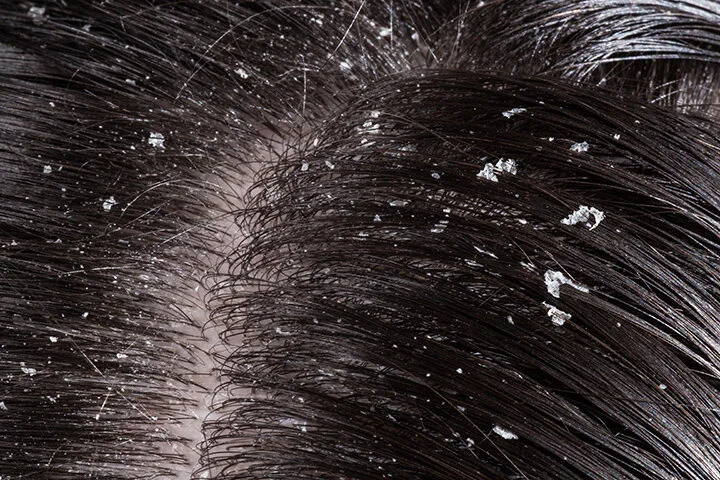Dandruff (Itchy Scalp)
Why do I have dandruff (dry and itchy scalp)?
Dandruff is very common, affecting up to a third of teens and adults. It is worse in the winter and with stress. Some people have visible flakes of dandruff (dead skin). Others have itchiness and red, scaly spots on their scalp. In babies, it is called cradle cap - see my page on Cradle Cap.
The same red, scaly spots on the scalp can also happen behind the ears, inside the ears, in the eyebrows, around the nostrils, and in the beard area in men. See my page on Facial Dandruff. It can even show up on the mid-chest.
How do I fix dandruff?
The mainstay of treatment for dandruff is a medicated shampoo. Each active ingredient is different. If one doesn’t work, try a different active ingredient. Remember higher price ≠ better results. I use the store-brand version of Head and Shoulders myself.
Shampoos with Active Ingredients:
Zinc pyrithione:
Head and Shoulders (1%)
Free & Clear (2%, for sensitive skin)
Amazon brand (1%)
Selenium sulfide: Selsun Blue
Salicylic acid: T/Sal
Coal Tar (0.5% or 1%): DHS
NOTE: Coal tar stinks but is a great active ingredient. Use a conditioner at the end of the shower to remove the tar smell.
Ketoconazole: Nizoral
How do you use dandruff shampoo correctly?
Most people don’t use dandruff shampoo right. If you rub it into your hair and rinse it right out, you won’t see any results.
To clear dandruff (do this DAILY for 1 week):
Wet your scalp in the sink or shower.
Massage the dandruff shampoo into your scalp, focusing on the skin under the hair.
Wrap a towel around your head and leave it on for 30 minutes.
Take a shower and rinse off the dandruff shampoo. You can use other shampoos or conditioners after this for your hair.
To keep it clear (at least 1-2 times/week):
Wet your hair first thing in the shower or bath.
Massage the dandruff shampoo into your scalp, focusing on the skin under the hair.
Use the same dandruff shampoo on the face if you have red or scaly spots there as well.
NOTE: ALL dandruff shampoos burn the eyes. To avoid burning, put the shampoo on the eyebrows like a lotion 10 minutes before your shower, then rinse off in the shower.
LEAVE ON FOR 5-10 MINUTES (LONGER IS BETTER)! The active ingredient needs TIME to soak into your skin to work.
Rinse out the dandruff shampoo at the end of the shower. Then use any nice shampoo and/or conditioner for your hair without any problems.
How long do I have to use dandruff shampoo?
Dandruff and itchy scalp are chronic issues. It usually requires long-term use of a medicated dandruff shampoo. However, some people only need it once or twice a week.
What do I do for my dandruff if the steps above aren’t working?
Here are a couple of additional tips that you can try:
A couple of times a week, wet your scalp and massage the medicated shampoo into your scalp. Then wrap your hair in a towel for 60 minutes while you eat breakfast or scroll through social media, then rinse off in the shower.
You can mix 3-4 different medicated dandruff shampoos in an empty bottle. The problem is that you won’t know which of the active ingredients is best for your dandruff. Another option is to use each shampoo daily for a week to see which helps the most.
Sometimes a dandruff shampoo may stop working. If you switch to a different active ingredient for a few weeks, usually your original shampoo will start working again.
Should I buy an expensive dry scalp shampoo?
NO! Don’t waste your time or money on an expensive “dry scalp” shampoo. Check the back label for an Active Ingredient listed at the top. I often see people buying expensive tea tree oil shampoos - these may help, but they haven’t been tested to actually show that they help.
What if my dandruff isn’t getting better?
The steps above help most people clear their dandruff. Sometimes a contact allergy, psoriasis, or another condition can cause itchy scalp. If over-the-counter shampoos are not working, prescription topical steroids can help get your dandruff under control. Look for a board-certified dermatologist in your area. If you are in or near Utah, see one of my excellent colleagues at the University of Utah or me virtually with Honeydew.
DISCLAIMER
The statements expressed and content of this website are not intended to be a substitute for professional medical advice. Readers should seek their own professional counsel for any medical condition or before starting or altering any treatment, exercise, or dietary plan. Please see our full disclaimer here.

